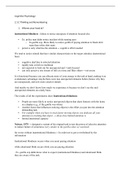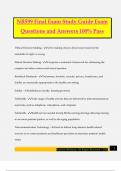Samenvatting
2.1C cognitive Psychology: Thinking and Remembering Summary
- Instelling
- Erasmus Universiteit Rotterdam (EUR)
If you are looking for a high-quality study summary document that provides a concise and informative overview of 2.1C Cognitive Psychology look no further ! My study summary notes are easily understandable. l provide you with all the necessary knowledge you need to master your exam I try to ...
[Meer zien]





